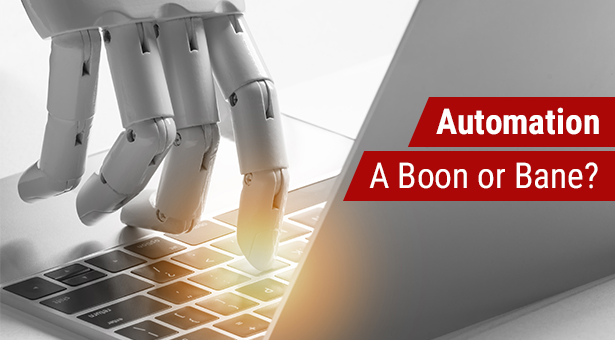“Apart from technological aspects businesses should always have the human value.”
During the initial days of industrial revolution, people were worried that they would get replaced by machines. Similarly, there’s a ongoing debate now that new technology might take away jobs and lead to a greater income inequality. But the best way of focusing on the human impact of automation is to first accept that it is inevitable. As we all know, automation holds the prospect of transforming future society. Even now, there’s been a sea change in how we work. Whether it’s hailing cabs with a tap on your smart phone, or getting your bank account statements without ever visiting the bank, or ordering food, automation and computerization have given us a new way of doing things. Robots are poised to replace workers in many industries. But a question arises as to whether, it will make our lives easier or only increase income inequality?
Retail jobs are disappearing & online sellers supplanting them filling their warehouses with robots instead of human workers. And on farms around the world, automated systems are beginning to take on backbreaking tasks like weeding lettuce. New technologies threaten around two-thirds of jobs in the developing world. But jobs that require emotional skills are difficult to automate. Artificially intelligent software is being built that can recognize emotions in people’s faces and voices, but it is a long way from simulating genuine empathy.
As robots come for our routine jobs, the ability to work well with others is becoming a key to success at work. A 2016 World Bank review of 27 studies of employers found that 79% of them ranked a socio-emotional skill such as honesty or the ability to work within a team as the most important qualification for workers. As populations in many countries age and non-communicable diseases grow, the World Health Organization says that the world will need 40 million new health workers by 2030 and we’re on course to fall short by 18 million. Education is another industry where the need for emotional connection makes automation unlikely. Teaching young children demands human engagement, in order to motivate students, spot potential developmental problems and instill social skills. As it turns out, that also appears to be true of adult education.
The rising importance of emotional work is likely to affect most of us. Each of us can put effort into sharpening our emotional skills as well as our technical ones. What needs to be done by the governments is to harness the cost savings from automation, and use that money to invest in increasingly important emotional jobs. Automation has the potential to create enormous worldwide wealth, and it’s vital that we channel some of this into work that engages all of our human capacities, so that we can help each other thrive.


